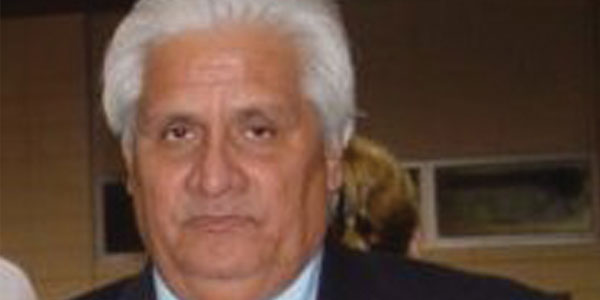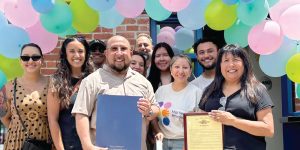
Florentino “Tino” Camacho Jr. vivió primero el racismo con su abuela.
En el lugar donde la mayoría de los niños aprenden primero sobre al amor incondicional, la aceptación y el apoyo, Camacho encontró humillación y desilusión.
“Ella me hacía sentir que no era suficiente bueno (para ella) debido al color de mi piel”, recordó Camacho recientemente. “Ella era una mujer mala y rencorosa. Cuando yo tenía 8 o 9 años, le pregunté qué debía hacer yo sobre el color de mi piel. Yo le dije, “Dios me hizo de esta manera; ¿Qué debo hacer?”.
“Ella nunca me contestó. Fue con ella que yo aprendí desde niño que la gente te juzga por el color de tu piel y no por quien tú eres por dentro”, continuó.
Más de 40 años después, Camacho ha aceptado esa lección y está enseñando una lección diferente: tratar a toda la gente con compasión y amor. Esa actitud ha impulsado el trabajo de Camacho como un activista comunitario para detener las injusticias.
En la parroquia Christ the King (Cristo Rey) donde Camacho ha sido miembro desde que se mudó al área de Kansas City con su familia en 1989, él ha sido a quien se recurre cuando las personas enfrentan discriminación, racismo o acoso. Él se mantiene activo en el grupo comunitario Clero e Iglesia contra la Raza y la Violencia, y con frecuencia se le ve regalando dinero o posesiones porque otros lo necesitan.
“Nuestra fe nos enseña que el racismo es un pecado. Necesitamos ser explícitos. Al hablar sin temor, cambiarán los corazones y las mentes. Nuestra fe nos llama para hacer esto”.
Aunque la fe católica de Camacho lo apoya, no siempre fue así. Quien una vez fue monaguillo, se alejó de la Iglesia por casi dos décadas. Lo que empezó como un sentimiento de culpabilidad por la muerte de su hermanito que de bebé se ahogó en una bañera, se convirtió en la creencia de que no necesitaba de Dios. La muerte de su madre cuando él tenía 28 años, llevó a Camacho más tarde a no solamente reevaluar su vida, sino también a descubrir su verdadera misión.
“Perdí el control de lo que pensé que tenía. Había sido tan positivo que pensé que no necesitaba de Dios. Pero sin importar lo que hiciera, no podía darle de nuevo la vida. Entonces supe que la vida y el éxito significaban más que dinero, carros o prestigio”.
Al mismo tiempo, Camacho perdió su trabajo y se vio en deuda y deprimido. Pensó en el suicidio pero una experiencia de conversión cambio eso.
Con el tiempo, Camacho encontró un trabajo con buen salario, empezó a ir a la iglesia y a dar clases de Hermandad de Doctrina Cristiana. Él se acercó a quienes el sentía que tenían problemas. Con cada paso hacia la Iglesia y hacia Dios, encontró una paz y felicidad que nunca había conocido. Cuando la familia se mudó al área para estar cerca de la suegra de Camacho, él encontró nuevas maneras para ayudar a otros.
De boca en boca, Camacho y su familia han ayudado a cientos de personas a encontrar justicia, paz o compasión -todo como voluntarios. Su teléfono suena a tres o cuatro veces diarias con personas pidiendo ayuda.
“Dios mira los corazones de las personas y cómo le servimos. Lo que hago no lo veo como una obligación, sino como un privilegio. Ayudar a la gente es un privilegio que tengo el honor de tener”.
_________________________________________________________________________________________________________________
Early encounter with racism inspires compassion, activism in Camacho
By Pamela Reeb
Florentino “Tino” Camacho Jr. first experienced racism at his grandmother’s knee.
Where most children first learn about unconditional love, acceptance and support, Camacho found derision and disappointment.
“She would make me know I wasn’t good enough (for her) because of the color of my skin,” Camacho recalled recently. “She was a mean, spiteful woman. When I was 8 or 9 (years old), I asked my grandmother what I was supposed to do about my skin color. I said, ‘God made me this way; what am I to do?’ ”
“She never answered me,” he continued. “It was from her that I learned young that people judge you on the color of your skin and not on who you are inside.”
More than 40 years later, Camacho has come to terms with that lesson and is teaching a different lesson: Treat all people with compassion and love. That attitude has fueled Camacho’s work as a community activist to stop injustices.
At Christ the King Parish, where Camacho has been a member since moving to the Kansas City area with his family in 1989, he has become the “go-to” guy when people face discrimination, racism or harassment. He is active in the community group Clergy and Church Against Race and Violence, and is often found giving money or possessions away because others are in need.
“Our faith teaches that racism is a sin,” Camacho said. “We need to be vocal. By speaking up, hearts and minds will change. Our faith calls us to do this.”
Although Camacho’s Catholic faith sustains him, it wasn’t always so. The onetime altar boy fell away from the church for almost two decades. What started as guilt over the death of his infant brother who drowned in a bath he had drawn grew into a belief that he didn’t need God. His mother’s death when he was 28 started Camacho down the road of not only re-evaluating his life, but also discovering his true mission.
“I lost the control I thought I had,” he said. “I had been so positive that I thought I didn’t need God. But no matter what I did, I couldn’t bring her back from the dead. I knew then that life and success were more than money, cars or prestige.”
At the same time, Camacho lost his job and found himself in debt and depressed. He considered suicide. A conversion experience changed that.
Eventually, Camacho found good-paying work, began attending church and teaching Confraternity of Christian Doctrine classes. He reached out to those he sensed were struggling. With each step toward church and God, he found a peace and happiness he’d never known. When the family moved to the area to be close to Camacho’s mother-in-law, he found new ways to help others.
By word of mouth, Camacho and his family have helped hundreds of people find justice, peace and/or compassion – all on a volunteer basis. His phone rings three or four times nightly with people calling for help.
“God sees the hearts of people and how we serve him,” he said. “I see what I do not as a duty, but as a privilege. Helping people is a privilege that I am honored to have.”










